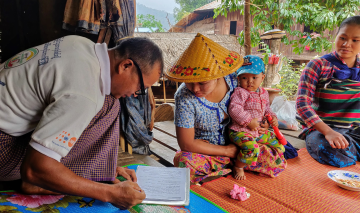Report: a mixed response to Asia's malaria elimination trajectory
23 April 2019
A new report to help inform domestic and donor decisions and commitments relating to malaria elimination in the face of increasing challenges, was launched today in Bangkok to mark World Malaria Day on 25 April. Malaria Futures for Asia (MalaFAsia) captures the views of malaria experts in Cambodia, India, Myanmar, Thailand and Vietnam on progress towards malaria elimination. The study was commissioned by Novartis and Malaria Consortium was invited to co-chair the launch.
Respondents included malaria programme directors, researchers and NGOs, who were asked to give their views on a range of issues relating to malaria. The main points are captured below.
According to the World Health Organization, the South and Southeast Asia region has seen the number of reported malaria cases per thousand population fall by over 60 percent since 2010. Two-thirds of respondents in this study felt P. falciparum would be eliminated by 2030. However, despite the commitment from the Asian region to eliminating malaria by 2030, less than half shared similar optimism for elimination of P. vivax within the same timeframe.
The report also revealed concerns around maintaining malaria treatment and diagnosis skills in low transmission contexts. Speaking at the launch, Malaria Consortium's Technical Director, Dr James Tibenderana, pointed out: “An effective way of preserving and strengthening these skills is to train community and facility-based health workers on a broader range of childhood diseases. This ensures they remain active in communities and continue to support crucial malaria case monitoring and surveillance as countries move towards elimination.”
Resistance to insecticides and to artemisinin-containing treatments is also a serious concern with a third of respondents expecting widespread resistance to affect their country within five years. Asian malaria experts surveyed commented that new drugs and tools are needed urgently. The report also highlighted, however, that innovations are not consistently shared and require more coordination and support. Over half the study participants were unaware of emerging technologies and tools for prevention.
Access to accurate diagnosis and effective treatment was seen to be good across all countries; however, all countries expressed concern about reaching vulnerable migrant and mobile populations. The involvement of civil society organisations is crucial to reaching those living in more remote and hard-to reach areas.
Finally, the overwhelming majority of respondents said climate change could have an impact on malaria outbreaks in the future, changing breeding patterns and increasing vector range. However, most respondents noted there was a need for additional evidence in this area to inform an effective response.
The Malaria Futures for Asia report follows the publication of the Malaria Futures for Africa report launched on World Malaria Day 2018.
Read the full report here.
Latest news
- Malaria Consortium honoured by Ugandan government for contribution to combat malaria23rd April 2024
- International summit calls for AMR accountability in public health interventions21st March 2024
- Global SMC community celebrates new milestone at SMC Alliance Annual Meeting in Nigeria6th March 2024
- Scaling up key interventions could halve pneumonia-related childhood mortality13th February 2024
- Malaria Consortium and eGov Foundation join Mozambique’s national malaria programme to digitalise seasonal malaria chemoprevention campaigns8th February 2024
- World’s first malaria vaccine rollout launched in Cameroon22nd January 2024